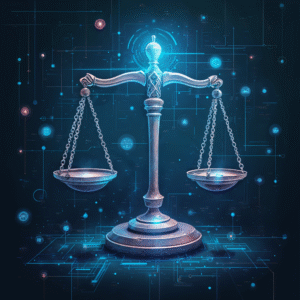Mainstream acceptance of blockchain is pending, and the opportunities to expand a lawyer’s practice are rich.
Blockchain is the next technology that lawyers shouldn’t ignore. In this article we will look at a few different outlets that the blockchain is advancing innovative functions within legal services.

Blockchain technologies are expanding into the following areas:
SMART CONTRACTS
INTELLECTUAL PROPERTY
CORPORATE FILINGS
CRIMINAL CASES
PROOF OF SERVICE
LITIGATION AND SETTLEMENT
BLOCKCHAIN-BASED ARBITRATION
E-DISCOVERY
PROPERTY RIGHTS
FINANCIAL TRANSACTIONS
ACCEPTING LEGAL FEES IN CRYPTOCURRENCY

SMART CONTRACTS
At its core, a smart contract refers to a self-executing computer program that operates within a decentralized blockchain network. Smart contracts offer notable characteristics such as transparency, immutability, and efficiency.
With more industries integrating smart contracts into their operations, lawyers should educate themselves on the workings and risks of these new applications.
Some argue that smart contracts could replace traditional contracts and lawyers. However, in practice, most smart contracts still require a traditional contract alongside them.
Therefore, it is more likely that smart contracts will work alongside written contracts. For example, in ICOs, a smart contract facilitates currency collection and token distribution, complemented by a written agreement that outlines risks and purchaser rights. Transactional lawyers must understand how to combine traditional and smart contracts effectively.
In transactional law, clients will need guidance on regulatory compliance and enforceability. Smart contracts may impact industries like data storage and e-commerce within existing regulatory frameworks. Proper structuring is crucial for successful business proposals, and lawyers are needed to ensure compliance with evolving regulations.
Lawyers and their organizations can benefit from smart contracts. Smart contracts, for instance, can be used by a business to automate escrow procedures, delivering money to the right people when commitments are met. The smart contract has the ability to refund money to the other party in the event of non-performance.
Similar to how they automate payments from a linked trust account to the business’ operating account, smart contracts also expedite client billing. By doing this, fee disputes are decreased, and time is saved processing bills and contacting clients.
Furthermore, safe record-keeping of client information, case files, and transaction histories is made possible for legal firms via smart contracts and blockchain technology. Sensitive client data is better protected when smart contracts are integrated with a data-management system, ensuring immutable, transparent, and secure records.




